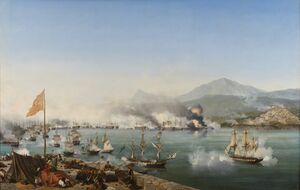Many thanks to our Patrons who cover ~2/3 of our hosting bill. Please join them if you can.
1827
Jump to navigation
Jump to search
1817 < 1818 < 1819 < 1820 < 1821 < 1822 < 1823 <1824 < 1825 < 1826 < 1827 > 1828 > 1829 > 1830 > 1831 > 1832 > 1833 > 1834 > 1835 > 1836 > 1837
 British, French, and Russian naval forces destroy the Ottoman Empire-Egyptian fleet at Navarino | |
| year 1827 |
Contents
Events
January–March
- January 27 – Author Johann Wolfgang von Goethe first elaborates on his vision of Weltliteratur (world literature), in a letter to Johann Peter Eckermann, declaring his belief that "poetry is the universal possession of mankind", and that "the epoch of world literature is at hand, and each must work to hasten its coming." [1]
- January 30 – The first public theatre in Norway, the Christiania Offentlige Theater, is inaugurated in Oslo.
- February 20 – Battle of Ituzaingo (Passo do Rosário): A Brazilian Imperial Army force is tactically defeated by Argentine–Uruguayan troops.
- February 28 – The Baltimore & Ohio Railroad is incorporated, becoming the first railroad in United States offering commercial transportation of both people and freight.
- March 7
- Brazilian marines sail up the Rio Negro and attack the temporary naval base of Carmen de Patagones, Argentina; they are defeated by the local citizens.
- Shrigley Abduction: Ellen Turner, a wealthy heiress in Cheshire, England, is abducted by Edward Gibbon Wakefield, the future politician in colonial New Zealand.
- March 11 – The new state constitution for the Mexican state of Coahuila y Tejas is ratified, including a phasing-out of slavery in its Article 13, which declares that "From and after the promulgation of the constitution in the capital of each district, no one shall be born a slave in the state, and after six months the introduction of slaves under any pretext shall not be permitted." [2] The prohibition of importing slaves from the United States was lifted when Texas declared independence in 1836, and the Republic of Texas Constitution provided specifically that Africans and "the descendants of Africans" will not be considered "citizens of the republic".
- March 16 – Freedom's Journal, the first African-American owned and published newspaper in the United States, is founded in New York City by John Russwurm.
- March 26 – German composer Ludwig van Beethoven dies in Vienna, after a prolonged illness. Thousands of citizens line the streets for the funeral procession 3 days later.
April–June
- April 7–8 – Battle of Monte Santiago: A squadron of the Brazilian Imperial Navy defeats Argentine vessels in a major naval engagement.
- April 10 – UK: George Canning succeeds Lord Liverpool as British Prime Minister.
- April 23 – John Galt founded the town of Guelph, Upper Canada.
- April 24 – Greek War of Independence – Battle of Phaleron: Ottoman troops defeat the Greek rebels.
- April 26–May 24 – The Royal Netherlands Navy's British-built paddle steamer Curaçao makes the first Transatlantic Crossing by steam, from Hellevoetsluis to Paramaribo.[3]
- April 29 – The Fly Whisk Incident in Ottoman Algeria: Hussein Dey slaps French consul Pierre Deval on the face, eventually leading to the Invasion of Algiers in 1830.
- May 20–July 9 – Zarafa, a giraffe presented by the Ottoman Viceroy of Egypt, Mehmet Ali Pasha, to King Charles X of France, the first to be seen in Europe for over three centuries, walks from Marseilles to Paris.=
- May 21 – The Maryland Democratic Party is founded by supporters of Andrew Jackson in Baltimore, and hosts its first meeting at the Baltimore Atheneum.
- May 25 – Romanian inventor Petrache Poenaru receives a French patent, for the invention of the first fountain pen with a replaceable ink cartridge.
- June 4 – French inventor Joseph Niépce sends a package to Louis Daguerre, revealing the existence of his invention, "heliography", where an image can be reproduced on to a pewter plate and then reprinted.[4] In 1829, the two will begin a partnership, and Daguerre will perfect Niépce's photographic process to reproduce images more quickly.
- June 7 – Greek defenders in Athens surrender to Egyptian forces, under the command of General Rashid Pasha.[5][6]
July–September
- July 6 – Greek War of Independence: The Treaty of London between France, Britain, and Russia, demands that the Turks agree to an armistice in Greece.
- July 14 – The Roman Catholic Diocese of Honolulu is founded in the Kingdom of Hawaii.
- August 31 – UK: Frederick John Robinson, 1st Viscount Goderich, becomes Prime Minister of the UK, following the death of George Canning.
- September 4 – Finland: The Great Fire of Turku destroys ¾ of the city, with 27 human casualties.
- September 20 – A petition for a land grant for 215 acres on the north bank of Rio Grande, just across from Paso del Norte (present day Ciudad Juárez), is approved; the first residence is built on what is present day El Paso, Texas.
- September 22 – Joseph Smith will claim in 1838 that on this day he took the golden plates from the place where they were stored, and that he began writing down the Book of Mormon from them the following December.
October–December
- October 1 – Russo-Persian War, 1826-1828: The Russians under Ivan Paskevich storm Yerevan, ending a millennium of Muslim domination in Eastern Armenia.
- October 20 – Greek War of Independence – Battle of Navarino: British, French, and Russian naval forces destroy the Turko-Egyptian fleet in Greece. This is the last naval action to be fought under sail alone.
- November – The term "socialist" is coined by Robert Owen in his London periodical, The Co-operative Magazine and Monthly Herald.[7][8][9]
- November 24 – Voting is completed in elections for France's 430 member Chamber of Deputies. The Ultraroyalistes, supporters of King Charles X, lose their 233-seat majority and finish with 180 seats, the same number as the opposition Doctrinaires.[10]
- December 20 – Mexico passes its first "expulsion law", providing for citizens of Spain to be expelled within the next six months, and to remain barred from re-entry until the Kingdom of Spain recognizes Mexico's 1810 declaration of independence. Ultimately, because of all the exemptions within the expulsion act, only 1,779 of the 6,610 Spaniards were required to leave.[11]
Date unknown
- Laos: King Anouvong of Vientiane leads the Laotian Rebellion against Siam, and successfully attacks Nakhon Ratchasima (the Siamese later invade Vientiane, and nearly destroy the whole city).
- Messenger of Peace built on Rarotonga by English Congregationalist John Williams to spread Christianity to Samoa and the Society Islands on behalf of the London Missionary Society.
- Englishman John Walker invents the first friction match, which he names Lucifer.
- Egypt: Cairo University School of Medicine is established as the first African medical school in the Middle East.
- John James Audubon begins publication of the 10-volume The Birds of America, in the United Kingdom.
Event
| Event | Start | End |
|---|---|---|
| Pax Brittanica | 1815 | 1915 |
A New Group
| Group | Image | Type | Description |
|---|---|---|---|
| KTH Royal Institute of Technology |  | Public Research | The highest ranked technical university in Sweden. |
Many thanks to our Patrons who cover ~2/3 of our hosting bill. Please join them if you can.
References
- ↑ Theo D'haen, The Routledge Concise History of World Literature (Routledge, 2013) p5
- ↑ Randolph B. Campbell, et al., The Laws of Slavery in Texas: Historical Documents and Essays (University of Texas Press, 2010) p14
- ↑ =https://web.archive.org/web/20101224202256/http://vrcurassow.com/2dvrc/sscuracao/sscuracao.html=
- ↑ "A Photo-engraving of 1826", in The Process Photogram and Illustrator (January, 1905), p82
- ↑ John Frost, History of Ancient and Modern Greece (Lincoln and Edmands, 1831) p355
- ↑ Afaf Lutfi al-Sayyid Marsot, Egypt in the Reign of Muhammad Ali (Cambridge University Press, 1984) p208
- ↑ John Harrison, Robert Owen and the Owenites in Britain and America: The Quest for the New Moral World (Routledge, 2009) p35
- ↑ James H. Billington, Fire in the Minds of Men: Origins of the Revolutionary Faith (Transaction Publishers, 1999) p245
- ↑ "Socialism", in Keywords: A Vocabulary of Culture and Society, by Raymond Williams (Oxford University Press, 2014) p224
- ↑ Gilles Jacoud, Political Economy and Industrialism: Banks in Saint-Simonian Economic Thought (Routledge, 2010)
- ↑ Timothy E. Anna, Forging Mexico, 1821-1835 (University of Nebraska Press, 2001) p203